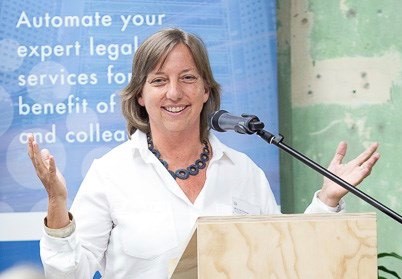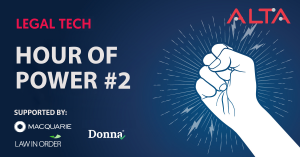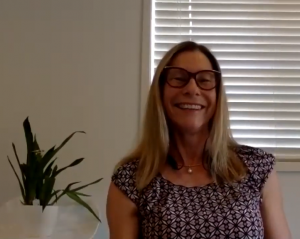Women of ALTA | Beth Patterson, ESPConnect
By ALTA Intern, Christine Bulos
Earlier this month, the Women of Australian Legal Technology Association (WALTA) hosted a highly informative event that showcased thought-leader Beth Patterson from ESPConnect. WALTA was specifically created to provide an open space for female leaders in legal tech to discuss, support and learn from one another. The group was formed as part of ALTA in 2018 and includes ALTA members and advocates of women in the Australian legal technology sector.
Guest speaker Beth Patterson is a recognised legal technology leader who maximises the value of digital transformation in the practice of law and future of work. She is Director of ESPconnect and is a UTS Faculty of Law Honorary Fellow. As a strategic consultant to businesses across the legal ecosystem, Beth has extensive experience developing innovation and legal tech strategies, with unique insight into building multidisciplinary teams to address the challenges of digital disruption.
The webinar kicked off with Beth walking us through her career journey, essentially giving us a glimpse into her life and how she got to where she is now, with humble beginnings doing programming at IBM in the US, to then working at a start-up here in Australia. Beth also later worked at Herbert Smith Freehills, where she was hired to implement and develop expert systems for the company. The question as to whether the impact of technology would affect the need for lawyers in the future was posed by a Senior Partner at the firm, to which Beth then responded that the need for lawyers will most definitely still remain. Beth noticed the cultural clash between technology and the law and how there would be a growing need to address the emerging area. Not long after such a discussion, law firms globally had instigated an innovation push and started developing AI strategy in attempt to ready themselves for the technologically advancing world and for what was to come soon thereafter.
Lawyer vs Technology
Beth addressed the clash between lawyers and technology and noted the vital requirement to maintain equal parts tenacity and humility. Lawyers tend to like to be in the driving seat due to the traditional, hierarchal nature of the profession. Beth also noted that there are some commonalities between lawyers and technology, including being relationship orientated, how both areas possess the thoroughness principle and both lawyers and technologists are great problem solvers.
There are however some differences that prevail, including the fact that lawyers tend to be more people orientated, whilst technologists are geared more towards being logic orientated. Beth emphasised specifically how important it is when hiring that the candidate is a great cultural fit, as the requirement to have the right skills and values is absolutely vital to overall success. She noted that there are various elements to consider when developing a great technical team including flexibility and having multi-disciplinary teams.
Beth often searched for candidates that possessed some of the following skills;
- Possessing the technical skills necessary for the role;
- Legal skills, including the ability to understand the legal verbose, if not a lawyer;
- Project management skills and the ability to understand how a project runs and are able to work well in a team environment;
- Excellent commercial skills and commercial acumen;
- Individuals that have a great core skill set, including possessing at least one of the above and the desire to develop the others further, and;
- Individuals who had a law degree, but specifically wanted to get into technology.
Beth also highlighted the core elements of inclusion, respect and fairness and how such elements must be prioritised in order to provide for a workplace that favours connection, growth, recognition of value and support of all.
Should lawyers learn how to code?
Beth moved on to also address the highly debated question of – ‘Should lawyers learn how to code?’
Her answer – NO!
Lawyers do not need to know how to code, however having an understanding of each other’s language and possessing a general understanding of what it involves and what it is more generally, is indeed important. However, it is crucial to keep in mind that the ‘lawyers who use technology, will replace those who do not.’
Beth also took various questions from the highly engaged audience and reassured us that the goal of technology in law isn’t to overtake and replicate everything that a lawyer does, and in turn replace them, but rather assisting in the efficiency process of our tasks.
More often than not, lawyers are deemed to be highly sceptical people, although very thorough in their tasks and in what they do. This naturally provides for the thoroughness principle, with the usage and implementation of technology then providing the efficiency aspect that lawyers and law firms instead often lack. Beth explained how in order to successfully implement different technologies, processes and systems into a firm, the technology must in itself provide for efficiency, but also possess the capacity to increase a lawyer’s ability to be thorough. The trust aspect is absolutely vital when making sales and successfully implementing new systems and technologies, therefore the overarching goal must be to firstly develop highly thorough and detailed programs, that are then also very efficient. This concept is essentially understood as the efficiency and thoroughness trade-off.
We encourage all to attend the next WALTA session to hear more from female leaders like Beth who successfully paved their way into a legal tech career. WALTA was formed to provide a space for thought leaders, entrepreneurs, innovators and everyone in between, with the sole aim of supporting, mentoring and elevating women in an otherwise male dominated industry. Therefore, be sure to keep an eye out for future WALTA webinars to be held!




